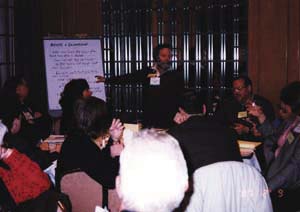
 |
|
|
|
|
Access v. ownership: are you entitled to what you've bought? There is a reoccupation in the library community with retaining possession of the content of electronic subscriptions after cancellation. Electronic subscriptions are, however, quite a different animal to those which are print-based. They comprise elements such as interactivity and hyperlinking, which are just not possible with print. By their very nature, publishers cannot guarantee the permanence of these features. Also, with electronic subscriptions, a subscriber is paying for access, not ownership. Some publishers are addressing this concern by providing permanent access to subscriptions via a CD-ROM. Subscribing organisations then own a copy of the subscription they purchased access to. Do Library Link members agree that this is a reasonable solution, given that that electronics necessitate a different mind-set to print?
 (a) Lapsed Subscriptions Library collections have traditionally comprised printed materials, which libraries have purchased a copy of. They then own that copy, and are responsible for ensuring that it is able to be accessed in perpetuity. With electronic materials, librarians are expected to purchase access to works, often without becoming the owner of some kind of copy of it. Some publishers address this concern by providing libraries which cancel subscriptions with a copy of that which they purchased access to, via CD-ROM. The library then owns that copy of the work, but it remains the responsibility of the library to ensure that it is able to be accessed in perpetuity. Librarians agreed that it is the responsibility of the library to keep up to date with technology and effect any conversions necessary to ensure this access in perpetuity. What librarians did not agree with, however, was not being given a choice of medium for provision of the copies. Libraries organise materials by subject, not publisher; they would like the option of CD-ROM or download from the publisher's server. This would enable them to organise copies of works by subject. (b) Current Collections Librarians are concerned about the ephemeral nature of commercial publishing. Motivated by profit and financial viability, and operating in an environment where merger and acquisition is commonplace; what happens if a publisher folds? For this reason librarians, and indeed their organisations' auditors, are reluctant to dispense with print in favour of electronic access. They have a little more faith in the electronic materials published by non-profit bodies such as Johns Hopkins University Press' Project MUSE, but even their permanence is dependent on a funding stream which could conceivably dry up. Some publishers have sought to address this concern by making OCLC the back-up permanent archive of their publishing output. But even the permanence of OCLC as a repository is not guaranteed, since its role in this regard is dependent on its aims and objectives continuing to include it. These are influenced by political forces. (c) Licensing Librarians felt that copyright has been replaced by licencing as the intellectual property issue of the electronic environment. Authors are concerned about reuse of their work, and feel publishers should consider asking them to licence their work, instead of assigning copyright. Another model suggested by librarians is one not unlike that of stock/shareholding. Publishers and authors are both stakeholders in the scholarly communication process, i.e. it is a process, not a product. In this scenario, though, who would manage the archive? (d) Inviolability The potential for interference in the process of scholarly communications was another important issue for librarians in the new electronic environment. They were concerned that electronic archives be inviolable, and that safeguards be put into place to guarantee this.
|
|
|
|
e-mail: [email protected] tel: +44(0) 1274 777700 fax: +44(0) 1274 785201 60/62 Toller Lane Bradford West Yorkshire England BD8 9BY |